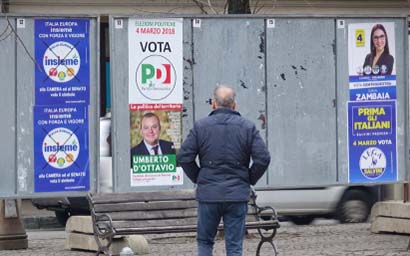The Italian election resulting in a deadlocked parliament means there is no particular increase in the chance that Italy would leave the Eurozone, according to some fund management observers.
Adrian Hilton, head of global rates and currency at Columbia Threadneeedle Investments, said the results were “messy” but that the chances of Italy leaving the eurozone had not gone up materially.
However, Elliot Hentov, head of policy and research in State Street’s official institutions group, said: “The fact that a majority of votes went to parties outside of the mainstream is likely to be a warning for markets that Italy’s and Europe’s core challenges remain unresolved.”
Markets will take note that euro assets need to reflect more than just the relatively buoyant economy, he added.
Claudio Ferrarese, portfolio manager at Fidelity International, said spreads on BTPs – Italian bonds – were only a few basis points wider which meant the market was not surprised by the election outcome.
Last week when investors poured €181 million into Italian government bond ETFs.
Ferrarese added: “Going forward the exact market reaction would depend on how diluted M5S would be in such a coalition — the softer their stance will become, as they negotiate with other parties, the better for BTPs at least initially. The market doesn’t like uncertainty, so it makes sense that the initial reaction might be a cold one until the fiscal path taken by the new government is better known.”
According to Diego Franzin, head of equities at Amundi, short term volatility was expected in the Italian and European markets, until at least the formation of the new government and the announcement of its economic and fiscal programme. It was crucial to understand the attitude towards the euro and what kind of interventions in pensions, tax incentives and debt reduction will be taken.
He said that the Italian market was the cheapest in the euro area and the discount was smaller compared to the previous crisis. The major difference with the previous political crisis was that the current European and worldwide economic recovery is much more resilient than in the past and the balance sheet of the companies are much stronger after many years of restructuring programs, he said.
“We already had some examples in Europe where a weak political situation didn’t damage too much the economic recovery and after the very first reaction markets tend to be driven by economic fundamentals. The long term drivers will be in any case the capacity of corporates to generate earnings,” Franzin added.
©2018 funds europe





